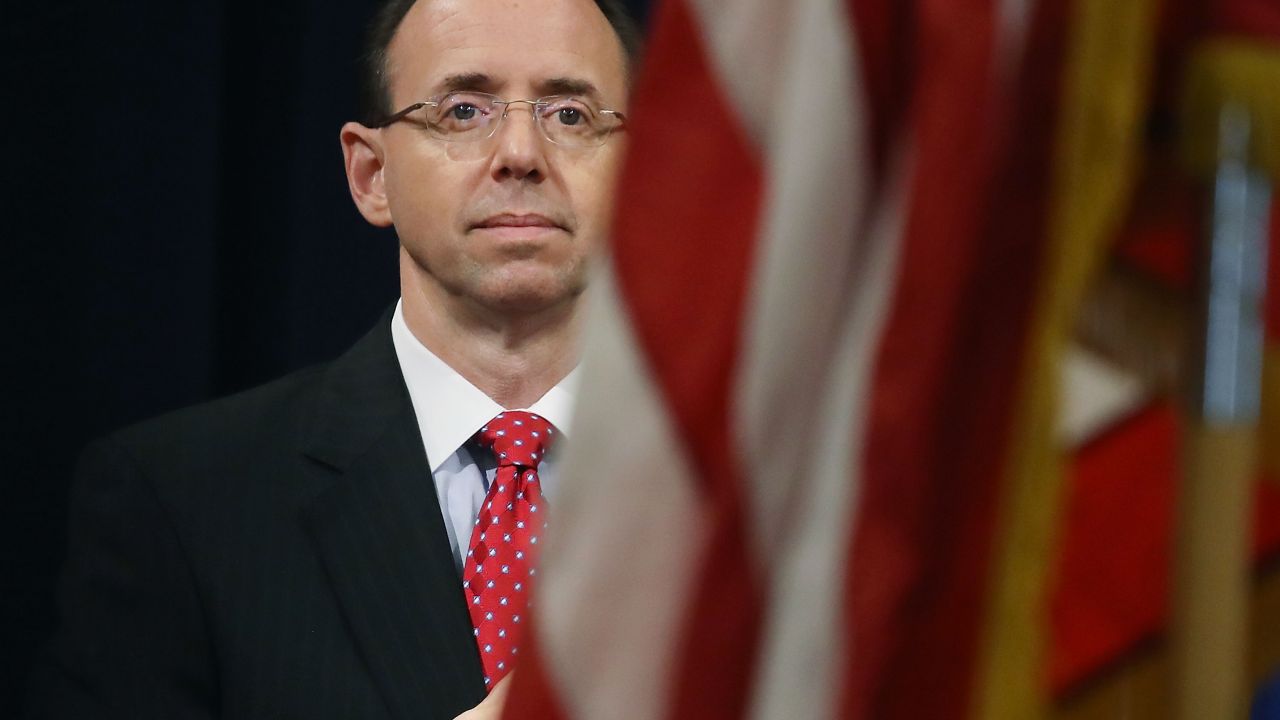
Deputy Attorney General Rod Rosenstein at the Justice Department in Washington, DC on May 31, 2017. (Photo by Mark Wilson/Getty Images)
Deputy Attorney General Rod Rosenstein (JD, Harvard, ’89) could have said no to a dangerous president, but he didn’t. Instead, he penned a two-and-a-half-page memo that the White House used to cover up Trump’s real reasons for firing FBI Director James Comey. As the cover-up imploded, Rosenstein became enveloped in the resulting firestorm. Since then, he has worsened his predicament.
By Rosenstein’s own account, the process of preparing his memo for the president involved none of the careful analysis that a lawyer typically would perform when advising a client about such a sensitive situation. Only once in history has a president fired an FBI director. And that was after the Justice Department produced a 161-page report documenting Director William Sessions’ improper use of government funds. The termination process was systematic, thorough, and took months.
At the outset, an attorney tries to learn relevant facts. But Rosenstein admits, “My memorandum is not a survey of FBI morale or performance.” Even the most minimal due diligence would have undermined one of his principal conclusions. If Rosenstein had asked, FBI Deputy Director Andrew McCabe would have told him that Comey enjoyed “broad support within the FBI and still does to this day…. The majority, the vast majority of FBI employees enjoyed a deep, positive connection to Director Comey.”
An attorney then relies on the facts and the law to build a case. But Rosenstein acknowledges, “My memorandum is not a legal brief;… My memorandum is not a finding of official misconduct;… My memorandum is not a statement of reasons to justify a for-cause termination.” He understates the deficiencies. His memo reads like a college term paper reciting personal views and reporting results from a quick online search. It relies on previously published statements by former government officials criticizing Comey’s pre-election statements about the FBI’s Hillary Clinton investigation. And even they didn’t say Comey should be fired. Except as a public relations device, Rosenstein’s memo was meaningless.
So why did he write it?
The Interview
Rosenstein is a 27-year veteran of the Justice Department. In 2007, President George W. Bush nominated him for a federal appellate judgeship that he didn’t get. Shortly after the 2016 election, Attorney General-designate Jeff Sessions (R-AL) interviewed him for the second-highest position in Trump’s Justice Department. For a seasoned prosecutor, Rosenstein’s admission about that encounter is remarkable.
“In one of my first meetings with then-Sen. Jeff Sessions last winter,” Rosenstein told Congress a week after the cover-up collapsed, “we discussed the need for new leadership at the FBI.”
His offhand remark glossed over an obvious question: As between Sessions (JD, Alabama, ’73) and Rosenstein, who raised that subject? The answer would have led to another question: Why? At the time, some dots were ripe for Rosenstein to connect, if he’d wanted to see them. Trump was deriding the conclusion of US intelligence that had Russia had interfered in the election to help him win. As dark investigative clouds hovered on the horizon, he regarded any ongoing investigation as the perpetuation of a “hoax.” He wanted it all to end.
Whatever test Sessions applied in that early meeting about new FBI leadership, Rosenstein passed with flying colors. On Jan. 31, the White House announced its intent to nominate him as deputy attorney general.
The Survivor
After admitting to lies about contact with Russia during the campaign, Sessions recused himself from the Trump/Russia investigation on March 2. As soon as the Senate confirmed Rosenstein — a prospect that seemed certain — the Trump/Russia investigation would land in his lap. Maybe Rosenstein didn’t realize it, but with Sessions’ recusal, Rosenstein became Trump’s new safety net, up to and including terminating Comey as FBI director.
Before long, it looked like Trump might need it. On March 20, Comey testified that since July 2016, the FBI had an ongoing investigation into Russian interference with the election, including “the nature of any links between individuals associated with the Trump campaign and the Russian government and whether there was any coordination between the campaign and Russia’s efforts.”
A week later, according to Comey’s friend Benjamin Wittes, Comey expressed his reservations about Rosenstein becoming his new boss. While lunching with Wittes on March 27, Comey reportedly said, “Rod is a survivor. So I have concerns.”
Survivor in Peril
Two weeks after Sessions had presided at Rosenstein’s April 26 swearing-in ceremony, both men were in the Oval Office with Trump. Rosenstein later described the meeting: “On May 8, I learned that President Trump intended to remove Director Comey and sought my advice and input. Notwithstanding my personal affection for Director Comey, I thought it was appropriate to seek a new leader. I wrote a brief memorandum to the attorney general summarizing my longstanding concerns about Director Comey’s public statements concerning the Secretary Clinton email investigation.”
Stated simply, Trump was firing Comey and he wanted a supporting memo from Rosenstein. Twenty-four hours later, he had it. It takes a failure of judgment, imagination or both not to have anticipated what would come next.
- May 9, 2017: Relying on Rosenstein’s memo and Sessions’ concurrence, Trump fired Comey. Later that evening amid bushes on the White House grounds, press secretary Sean Spicer said the impetus had come from Rosenstein. “No one from the White House,” Spicer said. “That was a DOJ decision.” On CNN, counselor to the president Kellyanne Conway echoed that position, embellishing it with excerpts from the Rosenstein memo that she read aloud.
- May 10, 2017: Vice President Mike Pence said repeatedly that Comey’s firing occurred because Rosenstein had recommended it. The deputy attorney general “came to work, sat down and made the recommendation that for the FBI to be able to do its job that it would need new leadership. He brought that recommendation to the president. The attorney general concurred with that recommendation.”
- Later on May 10, 2017: Deputy press secretary Sarah Huckabee Sanders said Trump had been thinking about firing Comey “since the day he was elected,” but reiterated the position that Rosenstein was “absolutely” the impetus for the firing. Trump had merely asked him to put his concerns in writing.
Before the day ended, Rosenstein had spoken by phone with White House counsel Don McGahn. According to The Wall Street Journal, Rosenstein insisted the White House correct the public misimpression that he had initiated Comey’s firing. The White House complied, releasing a new timeline of the events and reciting that the impetus for removing Comey came from Trump, not Rosenstein.
Survivor in Distress
The White House’s pivot didn’t get Rosenstein off the hook. The day after firing Comey, Russia’s Ambassador Kislyak and Foreign Minister Lavrov met with Trump, who boasted, “I just fired the head of the FBI. He was crazy, a real nut job. I faced great pressure because of Russia. That’s taken off.”
The next day, Trump told NBC’s Lester Holt, “Regardless of recommendation, I was going to fire Comey, knowing there was no good time to do it.” But then Trump added this: “And in fact, when I decided to do it, I said to myself, I said, you know, this Russia thing with Trump and Russia is a made up story….”
As the cover-up disintegrated, Rosenstein’s job interview with then-Sen. Sessions began to look like an earlier bookend to its troubling counterpart. When Rosenstein confirmed the “need for new leadership at the FBI,” he had boarded Trump’s train bound for Comey’s dismissal. The only question was when it would arrive.
Perhaps Rosenstein felt a chill when he read The New York Times on May 11, reporting on their private dinner on Jan. 27 when Trump sought Comey’s personal loyalty. Likewise, the days following May 18 couldn’t have been pleasant for Rosenstein after Benjamin Wittes’ views hit the national airwaves. After Trump’s loyalty request of Comey, Wittes thought that Comey was wondering what Trump had asked of Rosenstein — and what Rosenstein might have agreed to give him.
So far, Rod Rosenstein seems unfazed by the destruction of his reputation and his unfortunate place in history. Based on his fervent defense to Congress of the May 9 memo, he strapped himself to the mast of Trump’s battered ship and he plans to stay there. Any other course would require him to acknowledge the magnitude of his original Trump sin last winter.
Survivor’s Delusions
Those who think Rosenstein redeemed himself by appointing Robert Mueller as special counsel should think again. Mueller is an excellent choice, but a special counsel investigates possible crimes. As David Frum explains, it’s not a mechanism for identifying all potential threats to American democracy that may arise from Trump’s various relationships with Russia. If such threats fail to reach the threshold of criminal wrongdoing, a special counsel is supposed to look away and the public may never know. And remember, Mueller reports to Rosenstein, so Trump’s Justice Department safety net may still be intact. That’s why only an independent bipartisan commission can unearth and disclose the whole truth about the Trump/Russia controversy.
Rosenstein now faces limited options: resign, remain in office as a diminished leader with questionable judgment and uncertain integrity, or wait for Trump to fire him. The second and third options are not mutually exclusive.
The New York Times wonders whether Rosenstein “allowed himself to be drawn into a highly politicized firing, either as a willing participant or an unwitting accomplice.” There’s another possibility: The survivor overestimated his ability to withstand assaults from people like Trump and Sessions. Now, like many attorneys who refused to stand up to Trump when they should have, Rosenstein may soon need a lawyer, too.




